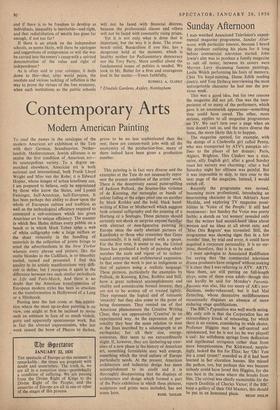Sunday Afternoon
I HAD watched Associated Television's experi- mental magazine programme, Sunday After- noon, with particular interest, because I heard the producer outlining his plans for it long before commercial television started. John Irwin's aim was to produce a family magazine to suit all tastes; between its covers were Mervyn Levy discussing famous paintings, Leslie Welch performing his feats of memory. Chin Yu hand-miming, Dame Edith reading poetry, and Tom Driberg interviewing the most unforgettable character he had met the pre- vious week.
This was a good idea, but for two reasons the magazine did not jell. One was the inex- perience of so many of the performers, which gave it an amateurish appearance—something time could have cured. The other, more serious, applies to all magazine programmes on TV. We can't turn over a page when an item doesn't suit us, and the more diverse the items, the more likely this is to happen.
The magazine opened, for example, with the doings of a Cinderella girl called Penny, who was transported by ATV's pumpkin air- liner to the places of her dreams : Paris, Algiers, Brighton. This Cinders was a nice, naive, silly English girl; after a good Sunday roast her naivety was charming : after a bad Saturday night her silliness .was painful. But it was impossible to skip, to turn over to the next page of the magazine. Instead, I would switch off.
Recently the programme was revised, becoming more professional, introducing an entertaining character in Max Adrian's Aunt Matilda, and exploring TV magazine possi- bilities in 'Voice of the People.' It still had weaknesses: last Sunday the Voice was pretty feeble; a sketch on 'cat women' revealed only that the writers had second-hand* ideas about women and no ideas at all about cats; and 'Miss Otis Regrets' was travestied. Still, the programme was showing signs that in a few months' time, by trial and error, it could have acquired a corporate personality. It is no sur- prise, therefore, that it is to be axed.
I must apologise to Associated Rediffusion for saying that 'the commercial television drama producers have resigned' without making it it clear that I was referring to ATV. ARTV, bless them, are still putting on full-length plays, some of them even adult—though this can hardly be said for Monday's Favonia. Favonia was also, like too many of AR's pro- ductions, under-rehearsed; but it had Mai Zetterling, whose decorative mellifluousness occasionally disguises an absence of more enduring stage qualifications.
The BBC's Pygmalion was well worth seeing. My only crib is that the Corporation has an extraordinary knack of miscasting, for which there is no excuse, considering its wide choice. Professor Higgins may be self-centred and opinionated, but he is not (as he was played) a cad : his selfishness springs from dedication and intellectual arrogance rather than from mere bumptiousness. Pat Kirkwood, surpris- ingly, lacked the fire for Eliza; her 'Ohl You are a cruel tyrant!' sounded as if it had been learned in her elocution lessons. She missed the pathos, too, but perhaps this was because nobody could have loved this Higgins, for she was best in the scene where she breaks from him. The revival was chiefly memorable for the superb Doolittle of Charles Victor; if the BBC keep a gallery of their Old Masters, this should be put in an honoured place. BRIAN INGLIS


































 Previous page
Previous page